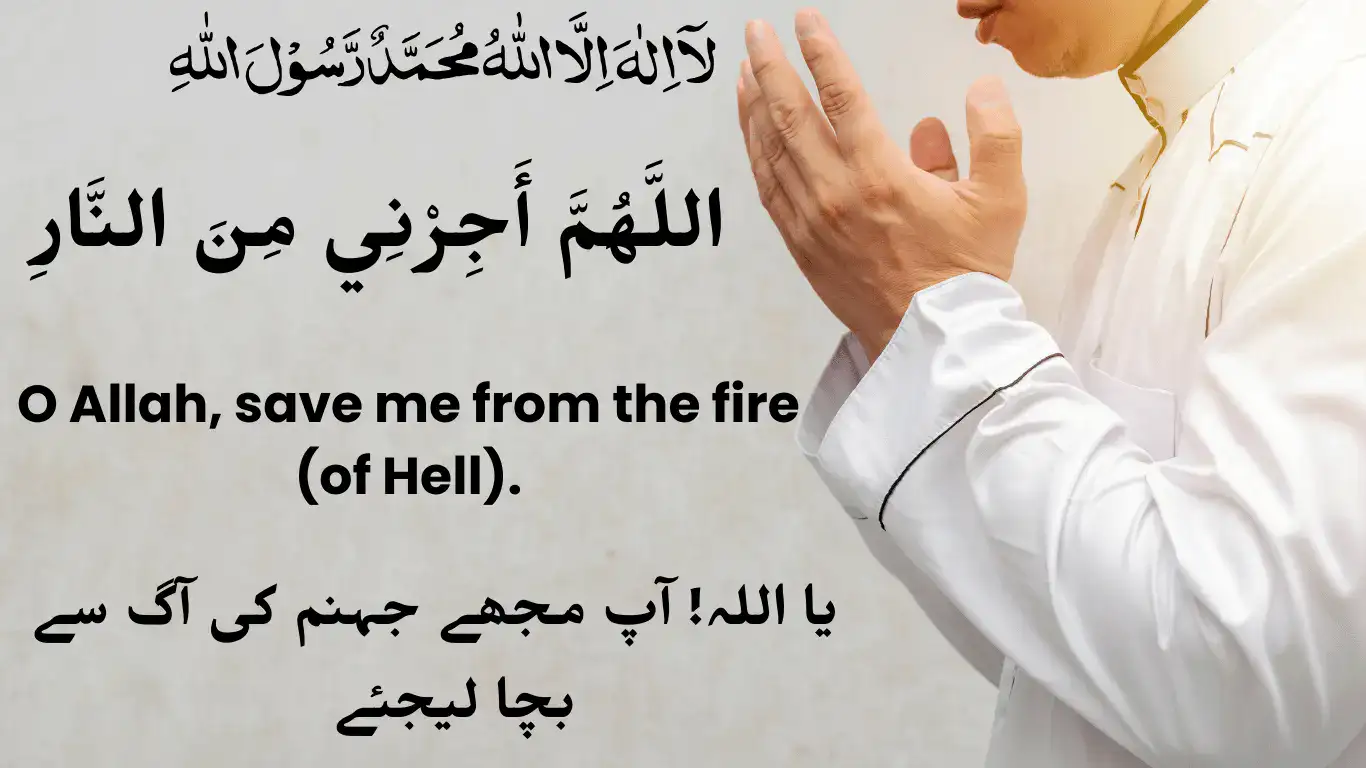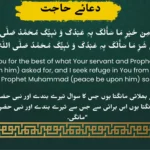Allahumma Ajirni Minan Naar (اللهم أجرني من النار) is a significant dua in Islam, recited for seeking protection from the torment of Hellfire. Muslims believe that making this supplication after Fajr and Maghrib prayers brings them closer to Allah’s mercy and safeguards them from the punishment of Hell. This dua carries a profound reminder of the Hereafter, encouraging believers to stay mindful of their actions in this life.
| Inna Lillahi Wa in Allah e Rajioon in Arabic |
| Allahumma Salli ala Muhammadin ﷺ |
| Astaghfirullah Rabbi Min Kulli | اَسْتَغْفِرُ اللّٰهَ رَبِّيْ مِنْ كُلِّ |
| Subhanallahi wa Bihamdihi Subhanallahil Azeem |
Arabic Text, Transliteration, and Translations of the Dua
Arabic: اللَّهُمَّ أَجِرْنِي مِنَ النَّارِ
Transliteration: Allahumma Ajirni Minan Naar
English Translation: “O Allah, save me from the fire (of Hell).”
Urdu Translation: “یا اللہ! آپ مجھے جہنم کی آگ سے بچا لیجئے۔”
This simple yet powerful dua is highly recommended for daily recitation, particularly after the Fajr (dawn) and Maghrib (sunset) prayers.
Importance and Meaning of “Allahumma Ajirni Minan Naar”
In Islam, asking for protection from Hellfire is a way to seek Allah’s mercy and guidance. Here’s an in-depth look at the components of this dua and why it holds such importance for Muslims.
1. “Allahumma” (O Allah)
The word “Allahumma” translates to “O Allah” and is a direct address to the Almighty. It reflects a believer’s reliance on Allah as the ultimate source of help and protection. Using “Allahumma” at the beginning of a supplication adds weight and reverence, emphasizing the supplicant’s trust in Allah’s mercy and power.
2. “Ajirni” (Save me)
The word “Ajirni” means “save me” or “grant me protection.” This word signifies the believer’s plea for safety and shelter from something harmful—in this case, the punishment of Hellfire. By asking Allah for protection, Muslims acknowledge their vulnerability and the need for divine support.
3. “Minan Naar” (From the Fire)
The phrase “Minan Naar” specifically refers to Hellfire. In Islamic teachings, Hell is described as a place of severe punishment for those who stray from Allah’s guidance. Asking for protection from Hellfire is a way to remind oneself of the Hereafter and to strive for a righteous life in obedience to Allah.
Benefits of Reciting Allahumma Ajirni Minan Naar
Reciting “Allahumma Ajirni Minan Naar” regularly, especially after Fajr and Maghrib prayers, is believed to offer numerous benefits:
- Divine Protection: Seeking refuge from Hellfire shows the believer’s consciousness of the Hereafter and desire for Allah’s mercy.
- Spiritual Strength: This dua strengthens faith by reminding Muslims to avoid sinful actions that could lead to punishment in the Hereafter.
- Daily Reminder of Accountability: By reciting this dua, believers renew their sense of responsibility for their deeds, promoting mindfulness and humility.
Virtues of Reciting the Dua After Fajr and Maghrib
In a hadith narrated by Abu Dawood (5090), the Prophet Muhammad (PBUH) recommended reciting this dua after the Fajr and Maghrib prayers. He said that anyone who asks for protection from Hellfire seven times after these prayers will be granted safety if they pass away that day or night. This virtue makes the dua a valuable addition to a Muslim’s daily supplications.
How to Incorporate Allahumma Ajirni Minan Naar into Daily Life
Here are some tips for incorporating this powerful dua into your daily routine:
- Recite After Fajr and Maghrib Prayers: Make it a habit to say this dua seven times after the Fajr and Maghrib prayers.
- Reflect on the Meaning: Each time you recite the dua, take a moment to reflect on its meaning and renew your commitment to living a righteous life.
- Encourage Family and Friends: Share the importance of this dua with family members and encourage them to include it in their prayers.
Similar Duas for Protection
Besides “Allahumma Ajirni Minan Naar,” there are other du’as that Muslims can recite for seeking protection from hardships and for safety in this world and the Hereafter. Some related supplications include:
- “Allahumma Inni A’udhu Bika Minan Naar” – “O Allah, I seek refuge with You from the Fire (of Hell).”
- “Allahumma Inni As’aluka Al-Jannah” – “O Allah, I ask You for Paradise.”
Incorporating these prayers regularly can help strengthen one’s faith and maintain a constant awareness of Allah’s mercy and the importance of righteous actions.
FAQs:
It is recommended to recite “Allahumma Ajirni Minan Naar” seven times after the Fajr and Maghrib prayers for protection from Hellfire, as mentioned in authentic hadith.
The phrase means “O Allah, save me from the fire (of Hell).” It is a supplication asking Allah for protection from the punishment of Hell.
Yes, according to a hadith, reciting this dua seven times after Fajr and Maghrib prayers may grant protection from Hellfire if the individual passes away that day or night.
In summary, Allahumma Ajirni Minan Naar is a powerful reminder of the Hereafter and a daily prayer for protection from Hellfire. Reciting it after Fajr and Maghrib not only brings blessings but also strengthens the bond between a believer and Allah, encouraging mindfulness and commitment to righteousness.




